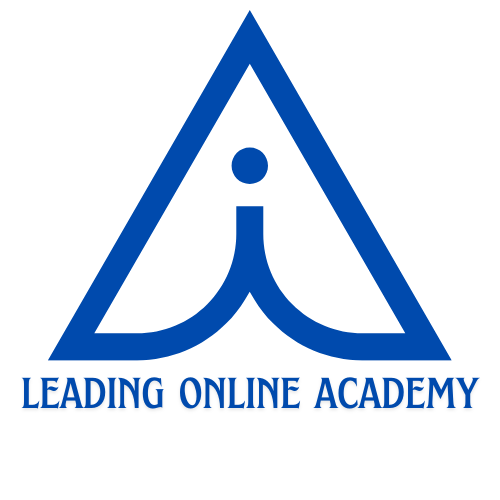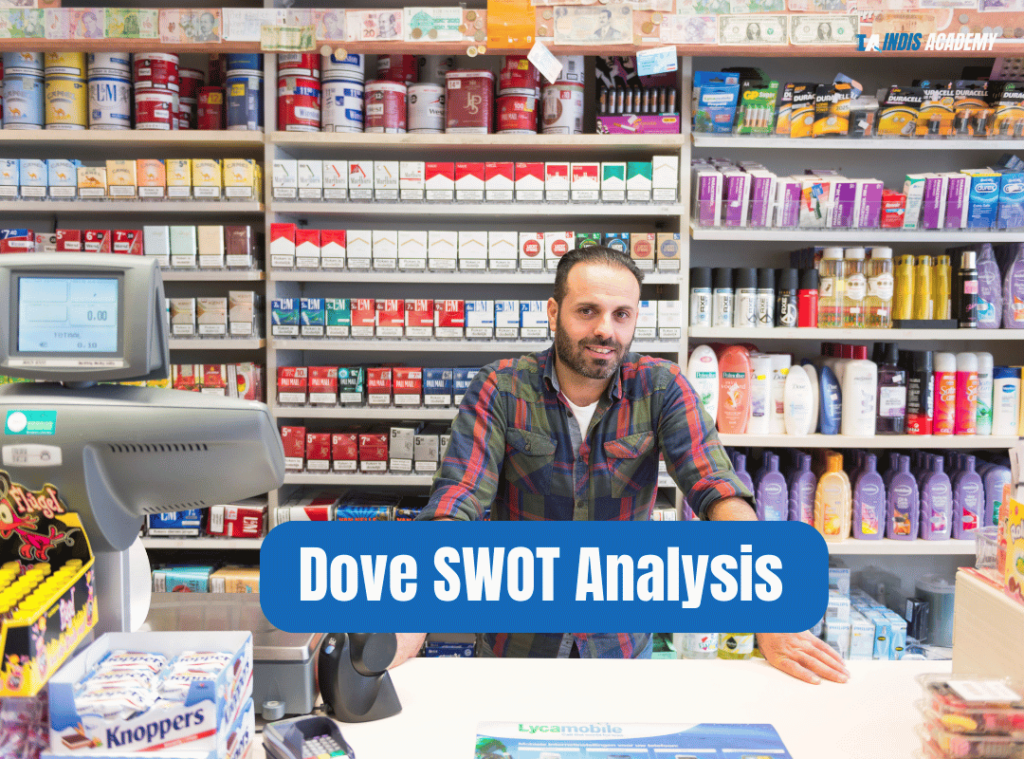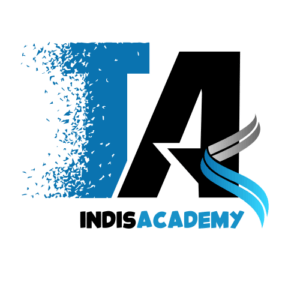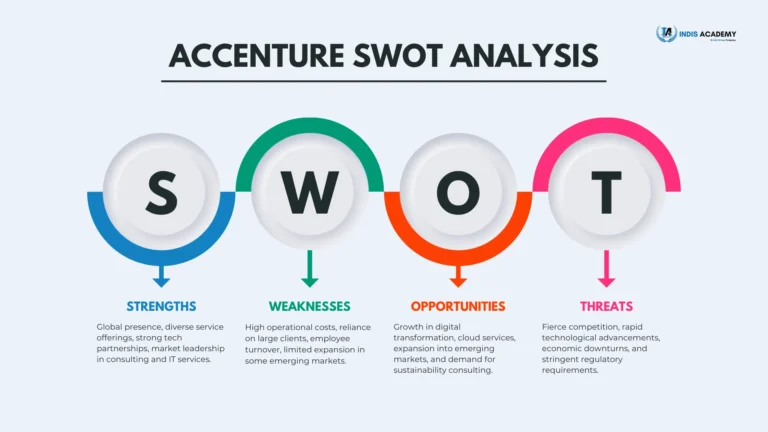Have you ever wondered how companies like Dove stay ahead in the competitive beauty industry? The secret lies in a tool called SWOT analysis. SWOT stands for Strengths, Weaknesses, Opportunities, and Threats.
It’s a method used by businesses to understand their current situation and make strategic decisions for the future.
Think of a SWOT analysis as a detailed roadmap. It highlights where Dove excels, like its strong brand reputation and loyal customer base (that’s the Strengths).
It also points out areas where Dove might struggle, such as market saturation or competition (these are the Weaknesses). Opportunities are the potential paths for growth, such as expanding into new markets or launching innovative products.
Lastly, Threats are the external factors that could impact Dove negatively, like new competitors or changing consumer preferences.
By performing a SWOT analysis, Dove can clearly see its strategic position. It helps the company leverage its strengths, address its weaknesses, seize opportunities, and mitigate threats.
This proactive approach is essential for Dove to maintain its leadership and continue delivering products that customers love. Ready to explore Dove’s strategic landscape? Let’s dive in!
In-Depth Dove SWOT Analysis
Dove is a globally recognized beauty brand that has been championing real beauty since its inception. Founded in 1957 by the Lever Brothers, Dove is part of the Unilever family.
The brand’s mission is to help women everywhere develop a positive relationship with the way they look, thereby raising their self-esteem. Dove’s product range includes skincare, haircare, and personal care items that are celebrated for their gentle formulas and nourishing benefits.
What sets Dove apart is its commitment to promoting body positivity and diversity, showcased through its powerful advertising campaigns that feature real women of all shapes, sizes, and backgrounds. This approach has made Dove a beloved and trusted name in the beauty industry.
| Detail | Information |
|---|---|
| Founding Date | 1957 |
| Founder | Lever Brothers |
| Company Size | Part of Unilever, a global company |
| Country | United Kingdom |
| Mission | Promote real beauty and self-esteem |
| Product Range | Skincare, haircare, personal care |
| Significance | Body positivity and diversity in advertising |
Dove Products & Competitors
When it comes to skincare and personal care, Dove has a fantastic lineup of products that cater to a variety of needs. Dove’s product range includes their famous Beauty Bar, which is much more than a soap—it’s a beauty bar that cleanses and moisturizes, leaving skin soft and smooth.
Their body washes, such as the Deep Moisture Body Wash, are also loved for their rich, creamy lather and skin-nourishing properties. For hair care, Dove offers shampoos and conditioners like the Intensive Repair Shampoo, which helps strengthen and repair damaged hair.
Dove’s deodorants are another popular choice, known for providing long-lasting protection while being gentle on the skin. Their Advanced Care Antiperspirant is a top pick for its moisturizing benefits and pleasant scent.
And let’s not forget Dove’s extensive skincare line, which includes lotions and creams designed to keep your skin hydrated and healthy.
In the competitive beauty industry, Dove faces strong competition from several well-known brands. Olay is a key competitor, renowned for its anti-aging skincare products. Nivea, with its extensive range of moisturizing creams and lotions, also gives Dove a run for its money.
Other significant competitors include L’Oréal, known for its wide array of beauty and hair care products, and Aveeno, which is famous for its gentle, natural ingredient-based skincare solutions. These brands, like Dove, strive to offer high-quality products that meet the diverse needs of consumers, making the beauty market an exciting and dynamic space.
Dove Competitors Details
| Competitor | Description |
|---|---|
| Olay | Olay is a well-known skincare brand that specializes in anti-aging products. Their Regenerist line is especially popular for its ability to reduce fine lines and wrinkles, making them a favorite among those looking to maintain youthful skin. |
| Nivea | Nivea, a staple in the skincare world, is famous for its moisturizing creams and lotions. Known for its iconic blue tin, Nivea offers a wide range of products that cater to different skin types and needs, from hydration to sun protection. |
| L’Oréal | L’Oréal is a global beauty giant that covers everything from skincare and haircare to makeup. With a strong emphasis on innovation and quality, L’Oréal has a product for almost every beauty need, making it a top competitor in the market. |
| Aveeno | Aveeno is celebrated for its use of natural ingredients, particularly colloidal oatmeal, which is gentle and effective for sensitive skin. Their products range from moisturizers to baby care, all aimed at promoting healthy, balanced skin. |
| Neutrogena | Neutrogena offers dermatologist-recommended skincare products that are effective and affordable. Known for their acne treatments and anti-aging lines, Neutrogena is a go-to brand for many looking for reliable skincare solutions. |
| Johnson & Johnson | Johnson & Johnson, while known for its baby products, also offers a variety of adult skincare items. Their gentle formulas and trusted brand name make them a significant player in the personal care market. |
| Garnier | Garnier focuses on accessible beauty products that often feature natural ingredients. Their skincare and haircare lines are particularly popular among consumers looking for effective yet affordable beauty solutions. |
| Cetaphil | Cetaphil is synonymous with gentle skincare. Recommended by dermatologists, their products are designed to be kind to sensitive skin while effectively cleansing and moisturizing. |
These competitors each bring something unique to the table, making the beauty and personal care market vibrant and diverse.
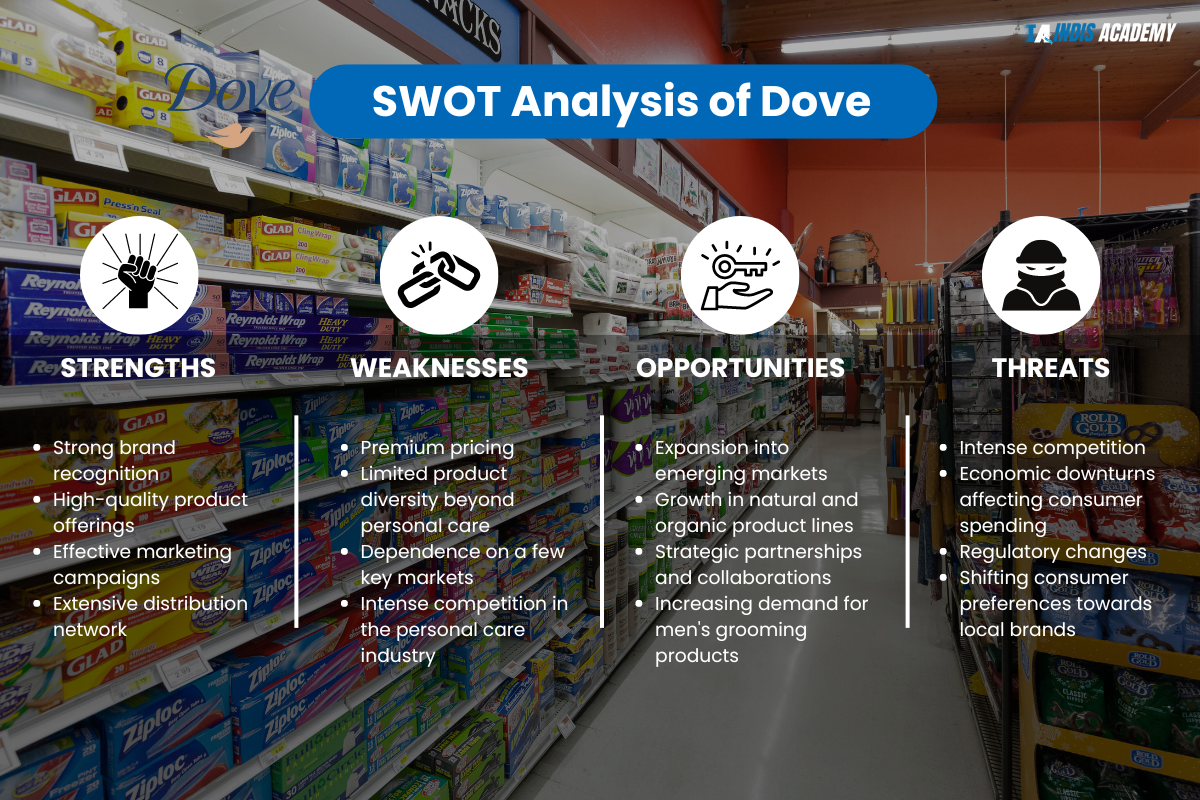
Dove SWOT Analysis
Dove’s SWOT analysis is a strategic tool used to evaluate the brand’s Strengths, Weaknesses, Opportunities, and Threats.
This analysis helps Dove understand its strong points, like brand reputation and customer loyalty, identify areas for improvement, spot new market opportunities, and recognize potential challenges.
By leveraging this insight, Dove can make informed decisions to maintain its competitive edge and continue to grow in the beauty industry. It’s like giving Dove a comprehensive check-up to ensure it stays ahead and thrives.
Strengths
- Strong Brand Reputation: Dove is widely recognized and respected for its commitment to promoting real beauty and self-esteem. Their marketing campaigns featuring real women have resonated deeply with consumers, building a strong, positive brand image.
- Loyal Customer Base: Dove’s focus on gentle, nourishing products has earned it a dedicated following. Customers trust Dove to deliver high-quality skincare, haircare, and personal care products that are effective and gentle on the skin.
- Diverse Product Range: From their iconic Beauty Bar to advanced hair care solutions, Dove offers a wide array of products. This diversity allows them to cater to different consumer needs, keeping their offerings relevant and comprehensive.
- Innovation and Quality: Dove is committed to innovation, continuously improving their product formulations to ensure the best results. Their research-driven approach ensures that they stay ahead in the competitive beauty industry.
- Ethical and Sustainable Practices: Dove is dedicated to sustainability and ethical practices, using environmentally friendly packaging and ethically sourced ingredients. This commitment resonates with environmentally conscious consumers, enhancing brand loyalty.
Weaknesses
- Market Saturation: The beauty and personal care market is highly competitive and saturated, making it challenging for Dove to stand out despite its strong brand.
- High Dependence on Parent Company: Being part of Unilever, Dove’s strategies and performance are influenced by the parent company’s overall policies and market conditions, which might limit its operational flexibility.
- Limited Presence in Certain Markets: While Dove is a global brand, its presence in some emerging markets is not as strong as in established ones, limiting its growth potential in these regions.
- Price Sensitivity: Dove’s premium pricing can be a barrier in price-sensitive markets where consumers may opt for cheaper alternatives, affecting its market share.
- Vulnerability to Market Trends: The beauty industry is highly influenced by trends. Dove’s commitment to its brand values may sometimes limit its ability to quickly adapt to changing consumer preferences and trends.
Opportunities
- Expansion into Emerging Markets: There is significant growth potential in emerging markets where Dove can leverage its brand reputation to capture new customer bases and increase market share.
- Product Line Extensions: Dove can explore new product categories, such as organic and natural beauty products, to meet the increasing demand for clean and green beauty solutions.
- Digital Marketing and E-commerce: Investing more in digital marketing and expanding its online presence can help Dove reach a wider audience and cater to the growing trend of online shopping.
- Collaborations and Partnerships: Forming strategic alliances with influencers, celebrities, or other brands can enhance Dove’s visibility and appeal, attracting new customers.
- Sustainability Initiatives: Strengthening its sustainability initiatives can further boost Dove’s brand image among environmentally conscious consumers, driving loyalty and sales.
Threats
- Intense Competition: Dove faces fierce competition from other established brands like Olay, Nivea, and L’Oréal, which continuously innovate and introduce new products to the market.
- Changing Consumer Preferences: Rapid shifts in consumer preferences towards natural and organic products can pose a challenge if Dove fails to adapt quickly enough.
- Economic Downturns: Economic instability and downturns can affect consumer spending power, leading to reduced demand for premium products like Dove.
- Regulatory Challenges: Changes in regulations related to cosmetics and personal care products can impact Dove’s operations, potentially increasing costs or limiting product formulations.
- Negative Publicity: Any negative publicity related to product safety, ethical practices, or environmental impact can significantly damage Dove’s brand reputation and consumer trust.
Conclusion
In wrapping up our SWOT analysis of Dove, we see a brand with a strong foundation and significant opportunities for growth.
Dove’s impressive strengths, like its solid brand reputation, loyal customer base, diverse product range, and commitment to innovation and sustainability, position it well in the competitive beauty industry.
These strengths are the pillars that support Dove’s ongoing success and consumer trust.
However, Dove must navigate several challenges to maintain its market position.
The saturated beauty market and high dependence on Unilever, combined with price sensitivity and vulnerability to market trends, highlight areas where Dove needs to be vigilant and adaptable.
On the bright side, there are numerous opportunities for Dove to explore, from expanding into emerging markets and extending product lines to leveraging digital marketing and enhancing sustainability initiatives.
These avenues can drive growth and further strengthen Dove’s market presence.
Yet, threats like intense competition, changing consumer preferences, economic fluctuations, regulatory changes, and potential negative publicity require careful management.
By strategically addressing these threats and capitalizing on its strengths and opportunities, Dove can continue to thrive and reinforce its leadership in the beauty industry.
Overall, this SWOT analysis underscores the importance of a balanced approach—leveraging strengths, addressing weaknesses, seizing opportunities, and mitigating threats—to ensure Dove’s enduring success and growth.
Also Read:
